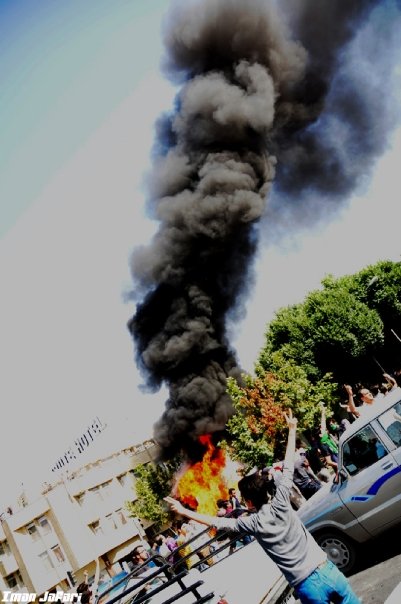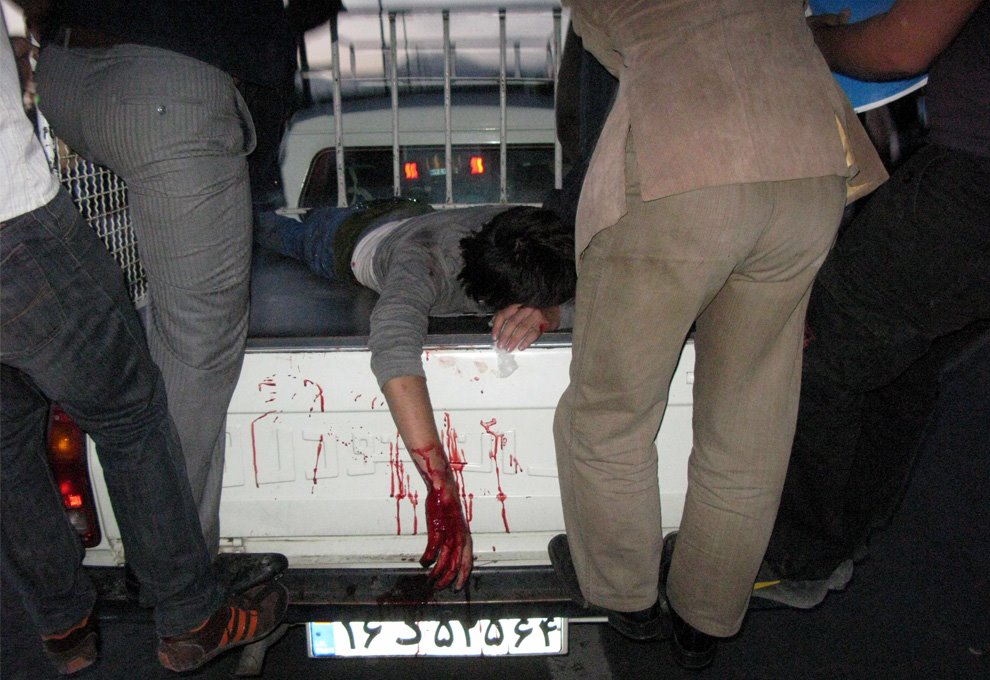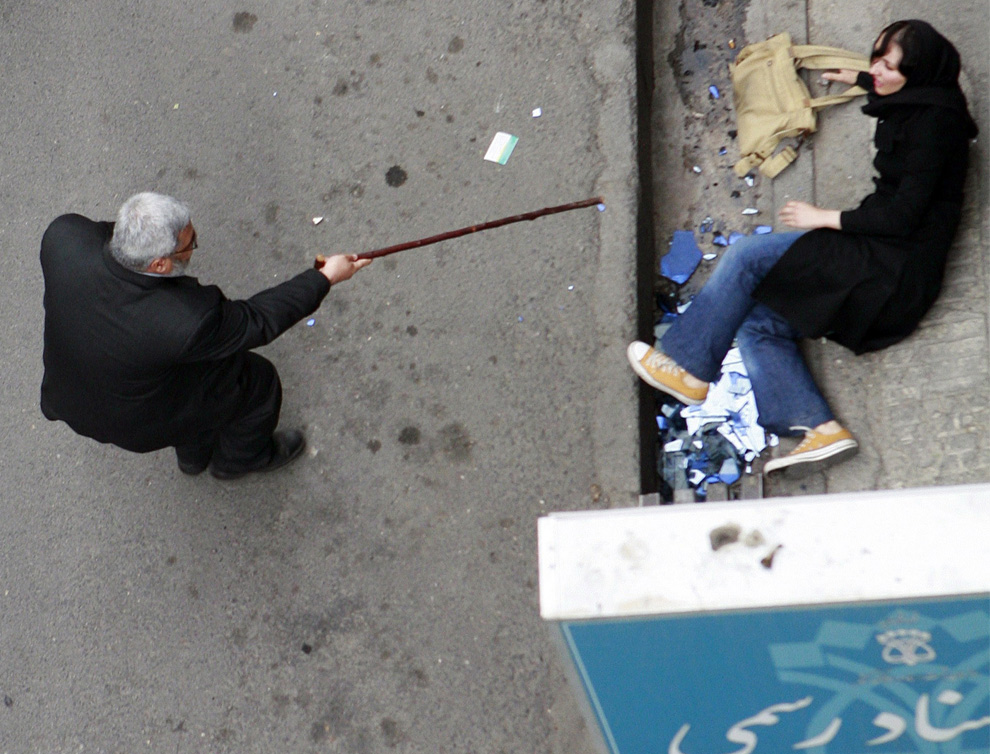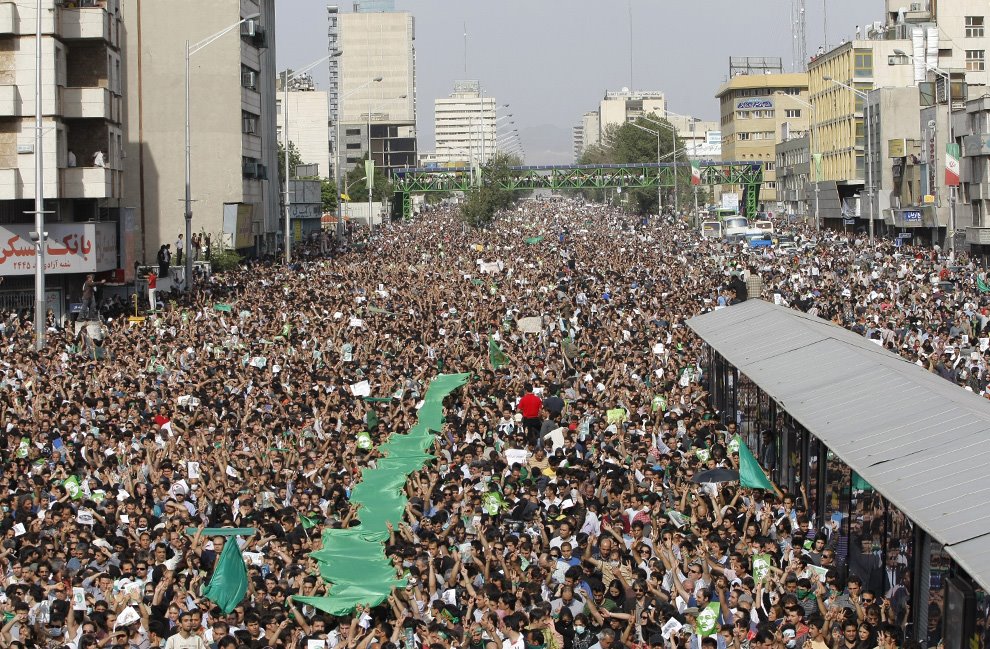EMERGENCY MEETING: The Crisis in Iran
Vartan Salakhanian | 15.06.2009 20:10 | Analysis | Repression | Social Struggles | World




Time: 14:00 - 18:00
Location: Caxton House
Street: 129 St. John's Way London, N19 3RQ, London
Iranian society is convulsed by a political crisis on a scale not seen for over a decade. Masses of Iranian people have taken to the streets since the results of the rigged elections. Their outrage is justified. The levels of blatant vote-rigging on show was crazy even by the standards of Iran's Islamic Republic regime. The final result underlined that the whole process was compromised from top to bottom:
• Ahmadinejad was declared winner by the official media even before some polling stations had closed
• Hundreds of candidates were barred from standing in the first place
• The percentage of votes for each candidate were clearly choreographed - throughout results night none of the candidates' vote varied by more than three percent
The main ‘reformist’ candidate Mir-Hossain Moussavi immediately declared the elections a “charade” and claimed Iran was moving towards tyranny. Thousands of protesters (not all of them backers of Moussavi) poured onto the streets and confrontations between the people and the state’s armed forces have escalated by the hour.
On June 15, official news outlets reported that an opposition rally had been called off after rumours circulated that state-sponsored militias had been issued with live rounds for the first time. (The truth may be somewhat different – see below).
Iranian society remains on a knife-edge. Hopi supporters are in daily contact with Iran and are pushing for maximum solidarity from the workers’ movement here to progressive forces in that country. We are determined that the upsurge against theocratic rule is not derailed by demoguoges and sell-out merchants from within the regime itself.
The main danger of that comes from Moussavi himself, the ‘reformist’ darling of the Western media.
While he correctly denounces these elections as a “charade”, what about the highly dubious results of the nine previous presidential elections in Iran's Islamic Republic? In the 2009 election, he did not bat an eyelid when the Council of Guardians disqualified over 400 candidates. He did not think the process was a “charade” when the supreme religious leader intervened time and time again to defend Ahmadinejad.
Even now, although he is furious about losing the elections, he is not calling on the Iranian people to mobilise – he fears losing control of the masses. Instead, he is calling on the 'Religious centres of Guidance' (elite shia Ayatollahs) to denounce the result. He is no fan of radical democracy and mass movements. And neither are the heads of imperialist governments like the US and UK, of course. They want to see a safe, orderly transition in Iran to a compliant, pro-western regime. The truth about the June 15 rally – reportedly cancelled because of safety fears – is that it was abandoned after Moussavi met with Khameini (Iran’s supreme leader) to share fears for the stability of the regime itself.
And, like his predecessor Mohammad Khatami, Moussavi is well aware that the survival of the 'Islamic order' is in his interests. That is why, even when he is clearly a victim of the supreme leader's lunacy, he cannot afford to see mass protest broaden, deepen and start to demand more fundamental change. This split within the ranks of the regime itself has allowed the smouldering anger below to find expression on the streets. However, we should not confuse the ordinary Iranians confronting the militias with establishment politicians like Moussavi – the interests of the two are distinct and, at the end of the day, in total opposition to each other.
Hopi stands against any interference by western imperialist governments in Iran – whether this takes the form of military attack, sanctions or a sponsored ‘colour revolution’ a la Moussavi. We say that the Iranian people themselves – the students’, women’s and working class movements – must fight for their own independent interests. A war would be a disaster for the working people of that country; but the barbaric rule of the theocracy is also intolerable and should be fought from below.
Iranian students report a June 14 wave of attacks on students in the Tehran, Babol and Isfahan universities with many badly beaten and at least one dead. Unless the protest movement becomes stronger and clearer in its aims, there is a real danger that the trend around Ahmadinejad will use the pretext of the disruption to launch a wave of repression across society as a whole.
We must do all in our power to stop this and stand in solidarity with our brothers and sisters in Iran. We have important work to do.
Come along to Saturday’s meeting and fundraiser for our comrades in Iran, organise meetings and actions locally, and support the struggle of the beacon of hope inside Iran - the struggles of the Iranian people.
**FACTS ON MOUSSAVI**
Irrespective of the illusions of their supporters, Moussavi and the other reformist candidate in the recent elections, Mehdi Karroubi, are no radical opponents of the regime. For eight years, Moussavi served as prime minister of the Islamic republic - during some of the darkest days of this regime. He was deeply involved in the arms-for-hostages deals with the Reagan administration in the 1980s, the affair that came to be known as ‘Irangate’. He also played a prominent role in the brutal wave of repression in the 1980s that exterminated a generation of Iranian leftists. During this period, thousands of socialists and communists were jailed, with many of them arbitarily executed while in prison.
Moussavi has attempted to refashion himself as a 'conservative reformer' or a 'reformist conservative' by expressing his allegiance to the supreme leader and by claiming to have initiated Iran’s nuclear programme, which he has promised to continue. He also criticised the release of British navy personal in 2007 as “a humiliating surrender”. Defending his government's anti-Western credentials, Ahmadinejad then counter-claimed that “prime minister Tony Blair had sent a letter to apologise to Iran”. Within a few hours, the foreign office in London issued a stern denial that such a letter was ever sent – an unprecented intervention which was a clear indicator who the west’s preferred candidate was. Moussavi tried to exploit this Ahmadinejad gaffe.
But he clearly failed. The supreme leader could not tolerate his former protégé Moussavi. Although his politics are almost indistinguishable from those of Ahmadinejad, he was just a bit too ‘progressive’ on two points:
He promised to be more liberal over women’s dress code and said he would expand women's rights –within the parameters proscribed by the religious state, of course
He promised to use more diplomatic language and a more amenable attitude in dealings with the West, especially the USA. Despite this diplomatic ‘packaging’, however, he remains committed to defending Iran's nuclear program (including the right to enrich uranium)
Mass protests
These elections themselves were a “charade” from the day they started. All four candidates were supporters of the existing system. All supported existing neo-liberal economic policies and privatisations that have pauperised wide swathes of Iran’s working people. All four are in favour of Iran's nuclear programme.
But we should not underestimate the anger of the Iranian population against this blatant manipulation of the results. Iranians had to choose between the lesser of two evils - and when the worst was declared winner, they showed their contempt for the system by huge demonstrations culminating in the massive protests of June 13 2009.
Until early June, most Iranians had shown little interest in these elections, as they knew that no candidate would produce real change. But it was the live TV debates that swept away the apathy. The debates betweeen Ahmadinejad-Moussavi and Ahmadinejad-Karroubi were unique events in the history of the official media of the Islamic Republic. The debates confirmed what most Iranians know through their personal experiences – but which they had never before heard on the official media:
• Ahmadinejad stated that Iran had been ruled for 24 years (up to his presidency) by a clique akin to an economic and political mafia. 'Elite' clerics such as the reformers Rafsanjani and Khatami had “forgotten their constituents” and were corrupt
• Moussavi stated that the economy has been in a terrible state, particularly in the last four years
The situation in Iran is very fluid. Over 900 protesters and 100 'reformist' leaders have been arrested, including the brother of former president Khatami. Moussavi and his wife have gone underground. There are signs of the beginning of an internal coup. Thirty years after the Iranian revolution, there is an irony in Iran's supreme leader using suppression against an opposition to a rotting, totally discredited regime. The parallel is with the chain of events that led to the overthrow of the Shah's regime in 1979. The foundations of the Islamic Republic regime are shaking.
The protests of June 13 were the largest demonstrations since 1979. After the euphoria of the last two weeks, when Iranians participated in their millions in demonstrations and political meetings, no state - however brutal - will be able to control the situation. The events of the last few weeks show that there is real hope that the Iranian people can get rid of this regime - be it in the guise of Ahmadinejad or the no less undemocratic and corrupt ‘reformists’.
 http://www.facebook.com/event.php?eid=112626230090&ref=mf
http://www.facebook.com/event.php?eid=112626230090&ref=mf
Vartan Salakhanian
 e-mail:
hopimanchester@googlemail.com
e-mail:
hopimanchester@googlemail.com
 Homepage:
http://www.hopoi.org
Homepage:
http://www.hopoi.org